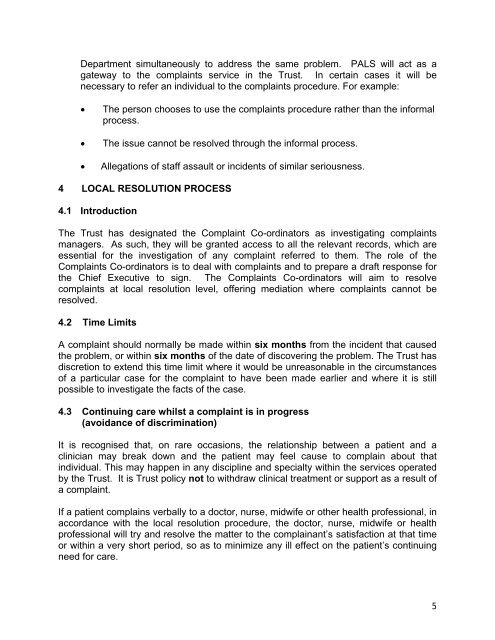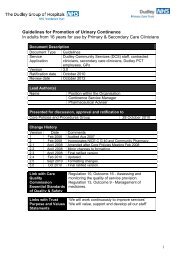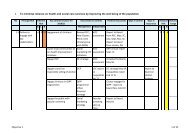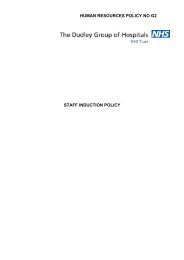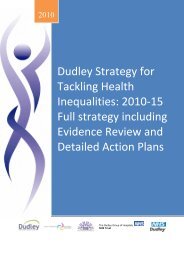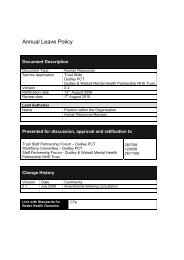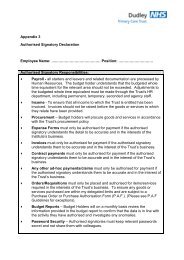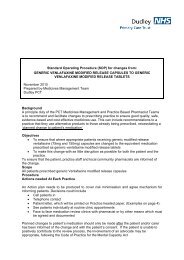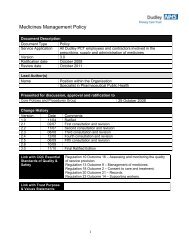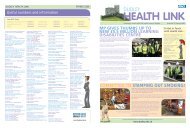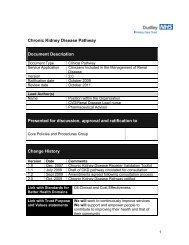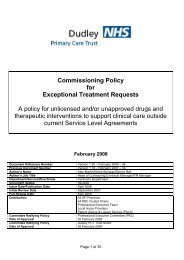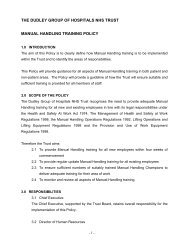the dudley group of hospitals nhs trust complaints policy and ...
the dudley group of hospitals nhs trust complaints policy and ...
the dudley group of hospitals nhs trust complaints policy and ...
You also want an ePaper? Increase the reach of your titles
YUMPU automatically turns print PDFs into web optimized ePapers that Google loves.
Department simultaneously to address <strong>the</strong> same problem. PALS will act as agateway to <strong>the</strong> <strong>complaints</strong> service in <strong>the</strong> Trust. In certain cases it will benecessary to refer an individual to <strong>the</strong> <strong>complaints</strong> procedure. For example:• The person chooses to use <strong>the</strong> <strong>complaints</strong> procedure ra<strong>the</strong>r than <strong>the</strong> informalprocess.• The issue cannot be resolved through <strong>the</strong> informal process.• Allegations <strong>of</strong> staff assault or incidents <strong>of</strong> similar seriousness.4 LOCAL RESOLUTION PROCESS4.1 IntroductionThe Trust has designated <strong>the</strong> Complaint Co-ordinators as investigating <strong>complaints</strong>managers. As such, <strong>the</strong>y will be granted access to all <strong>the</strong> relevant records, which areessential for <strong>the</strong> investigation <strong>of</strong> any complaint referred to <strong>the</strong>m. The role <strong>of</strong> <strong>the</strong>Complaints Co-ordinators is to deal with <strong>complaints</strong> <strong>and</strong> to prepare a draft response for<strong>the</strong> Chief Executive to sign. The Complaints Co-ordinators will aim to resolve<strong>complaints</strong> at local resolution level, <strong>of</strong>fering mediation where <strong>complaints</strong> cannot beresolved.4.2 Time LimitsA complaint should normally be made within six months from <strong>the</strong> incident that caused<strong>the</strong> problem, or within six months <strong>of</strong> <strong>the</strong> date <strong>of</strong> discovering <strong>the</strong> problem. The Trust hasdiscretion to extend this time limit where it would be unreasonable in <strong>the</strong> circumstances<strong>of</strong> a particular case for <strong>the</strong> complaint to have been made earlier <strong>and</strong> where it is stillpossible to investigate <strong>the</strong> facts <strong>of</strong> <strong>the</strong> case.4.3 Continuing care whilst a complaint is in progress(avoidance <strong>of</strong> discrimination)It is recognised that, on rare occasions, <strong>the</strong> relationship between a patient <strong>and</strong> aclinician may break down <strong>and</strong> <strong>the</strong> patient may feel cause to complain about thatindividual. This may happen in any discipline <strong>and</strong> specialty within <strong>the</strong> services operatedby <strong>the</strong> Trust. It is Trust <strong>policy</strong> not to withdraw clinical treatment or support as a result <strong>of</strong>a complaint.If a patient complains verbally to a doctor, nurse, midwife or o<strong>the</strong>r health pr<strong>of</strong>essional, inaccordance with <strong>the</strong> local resolution procedure, <strong>the</strong> doctor, nurse, midwife or healthpr<strong>of</strong>essional will try <strong>and</strong> resolve <strong>the</strong> matter to <strong>the</strong> complainant’s satisfaction at that timeor within a very short period, so as to minimize any ill effect on <strong>the</strong> patient’s continuingneed for care.5


